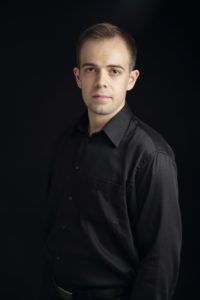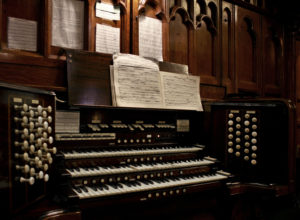Pavel Bogomyakov Successfully Takes On Our Old First Organ
Regarding navigating an organ as complicated as the one at Old First, summer music director Pavel Bogomyakov says, “I had some experience playing organs, but there are other things happening in church.”
To say the least! Much multitasking goes on when you are leading an Old First service in music and song. Pavel, who did a stupendous job of subbing for our Aleeza Meir during our summer services, was able to keep all the plates spinning (musically), and the organ pedals pumping. It could be a daunting task for any accomplished musician like Pavel, but he rose to the occasion every single Sunday, and made memorable, beautiful music.

Our intricate but intensely stunning three-manual organ is a late-19th-century Roosevelt creation built for our specific site and installed in 1891. The specifications for the instrument are available on the New York City Organ Project website. In addition to our organ, Pavel masterfully played our Steinway concert grand piano; it dates from 1888 and is used extensively for concerts and community groups as well as worship.
“From what I know, it is a very good old instrument,” he says of our historic organ. “It has an old look and an old, comforting feel to it, to go with a pleasant sound.”
Pavel was born and raised in Russia (Siberia) and now lives in Upper Manhattan. His American musical training includes The Juilliard School, the Peabody Conservatory, and the Manhattan School of Music. In addition to his musical accomplishments, he holds a B.S. in biochemistry and genetics from Johns Hopkins University.
Even with Pavel’s impressive credentials, our organ can be a challenge. When having to master the pedals and work with the instrument’s specific technology, the keys could be unforgiving. However, Pavel notices that, as a result of the extra work

Old First, Sunday December 5, 2010, Aleeza Meir, Organ
involved, “the pianist’s hand-position and technique can clean up significantly, and this is noticeable when returning to piano.”
As an accomplished musician, the features of the organ that strike you immediately are the multi-level keyboards. Yet that’s not what most concerns Pavel.
“The most intimidating thing is the camera,” he says of the device which helps him keep track of what’s going on downstairs, during the service, in real time. “The camera has a tendency to unplug itself. Then I can’t always hear what is being said while I’m up [at the organ console]! I hear something like echo unless Pastor Meeter turns his head toward me. And sometimes there is something happening that I need to be able to see, like when a communion is starting. So it was delayed by half a minute today, because I couldn’t see nor hear [due to the disconnected camera]. So with the technology, it’s either there or it’s not, but I can work around it.”
Another challenge: being physically closer to the organ doesn’t necessarily mean you’re in control of the instrument or the situation. Pavel explains:
“When playing a big hall (piano or violin), I’m able to disengage myself from where I am, so that I can hear right away how loudly I’m playing, how crisp the sound is. I try to put myself in the middle of the hall, to try to hear what other people can hear. Are they able to hear me? Is it loud enough? But with the organ, it’s a bit more complex. The closer I am to the organ, the stranger it is, because not everything is all in front of me. With the pipes, some are here and some are there. I am not able to hear some pipes as well. The sound comes later to me, so you adjust to the delay. It takes practice.”
He adds, “It’s a feel. With every instrument, you have to clock in those hours of practice so you can get used to the instrument.”
If practice makes perfect, Pavel adeptly and professionally gave us as close to perfect as we could ever hope for. We thank him for his high-level skill and incredible talent that infused our summer services!
Read more about our organ’s history — and its organists — on our blog. Click here!
